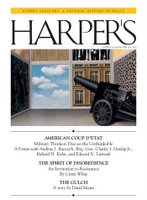 Four years gone by
Four years gone byToday is my four-year blogging anniversay. Hard to believe, that’s what they always say, and it’s true. My daughters were only two and three months. They’ve changed. A lot. But they’re still Eleanor and Audrey.
Same here. Four years of blogging and six years of parenthood have changed me good, but I’m still, uh, Bruce. I wonder which has changed me more? Ah, but life doesn’t break down into neat boxes, as much as the business world insists it does. And how has that world, the business world, shaped me? What about the political? The religious? The pop cultural? The technological?
My blogging has been about exploring these questions through some kind of weird alchemy of personal confession, political ranting, and desperate creativity.
As I wrote on my former blog,
My basic premise was: former dreamer becomes corporate cog; some little writing ability; unapologetic rock-n-roll heart; devoted to family; anti-capitalist; drinker. My task was to write a blog about this character, who I saw as an everyman. More than anything, I wanted this blog to have a ring of truth. “Honest” words were bound to be compelling words, I thought.
This everyman wanted to know: Where does my identity reside? Who or what is claiming ownership here? Does it reside within me, with integrity? Or is it assigned, manipulated, managed? How have those aforementioned circumstances and forces shaped me? Have they had more leeway then they should? Have I spent half my life, if not more, just covering up?
Other’s may have taken to the worldwide web looking to prove their chops as a pundit or analyst, an expert with a weighty opinion or a glib observer with an excellent education and a take on everything. I just wanted use words to connect to something real, inside and out. “Real” is a big word around my house. “Is this real?” my four-year-old will ask, as did her older sister in earlier days. And it’s big with me. Can we get beyond the surface, the industrial profusion of things, replicas, endless simulacra, 57 channels and nothing on? I thought blogging might be a tool I could use, the form for the self expression that did just that, if only to prove it to myself. Musicians have the three-minute rock song and the occasional album-oriented anthem. I had
a blog:
There are lines in pop songs that stay with me for a while, just pop into my head. They’re like soundtracks to whatever my I’m thinking about. “What’s so funny about peace, love and understanding” has been one, “we’re all sensitive people, with so much to give” has been another, more recent one (it’s from Let’s Get it On, by Marvin Gaye); and the one above.
I guess it’s illustrative of the influence that rock-n-roll, as I broadly define it, has had on me. It’s cliché to say that rock-n-roll saved your life, but it did mine, in a sense. And in today’s climate, the statement may even be laughable. Because rock and its rebellion has been so fully absorbed and exploited by the mainstream. You can still have it, it says, just buy a sporty Cadillac, or dress in Gap clothes. Consumerism. That’s your one choice now, disguised as a “liberating” smorgasbord of choices. Plus, our culture teaches us to suspect statements that are so plain and heartfelt. No, we are to carve out a superficial style (from the available lines), establish a hip cred, and laugh at everything else. Guard that territory with all due malice and cruelty. It’s all that matters. You’ve made it.
Rock, on the other hand, said “fuck that! That’s some grim shit. Let’s get together and celebrate our COMMON humanity.” So all the drawing of lines, all the institutions and structures of society that you were either in or out of (with us or against us), all that pressure to conform, could be loosened, cut down to size, danced upon. At least while the music played.
I started picking some chords. Heart on my sleeve stuff. When you’ve got nothing, you’ve got nothing to lose. If I could produce something worthwhile, perhaps I could begin to see my life that way, and therefore all life. Radical, I know, but if anything needed doing post Sept. 11, I figured it was some sort of revolution in consciousness. I thought we needed examples, bravery, guts. Besides, I was bored at work.
I went back yesterday and read my first few months of blogging. In
my first post, I wondered if my “voice” would have appeal:
Well, here we go. A foray into publishing on the Net. If I may be so bold as to call this publishing. This seems way too easy for that term, but that is the revolutionary nature of this whole blogger thing, which I've been reading about for months (and, of course, reading many a wonderful blog). Okay. So, is this a "voice"? Yes, yes it is. Is it appealing? Guess that remains to be seen. So...from the the High Water inner sanctum to....hmmm...well, someone, surely, will trip over this thing, and read it. Welcome.
It did, at least to a few other malcontents. My early blogger-self feels like a stranger, though. Almost a better me, although that can’t be true, given the growth that blogging has engendered. I still remember Marek responding to an early post in which I wondered if I should quit, who’s reading this anyway, etc. Marek responded: once you let your voice out of the cage, you can never put it back.

Yet I wonder if blogging has been too easy. If perhaps there’s a cage called discipline that is as necessary as this body is for my consciousness. And if maybe I jettisoned my former professional discipline a bit prematurely in the rush of instant publishing. Point. Click. Yer done. It’s been a great drug, opening me up to wider vistas, but have the effects reversed and imploded?
It’s almost like lost innocence.
That’s why I created The World’s Oldest Curmudgeon. I needed a voice that could step outside the blog, look at things with the humor and empathy of a distant perspective. “Kid, it’s just a freaking blog. It’s a playground. Play, damnit.”
Mudge played so well that others sought to buy a little of his spark. So many, in fact, that he became wealthy, which of course he thought was the ultimate irony, seeing as how his whole shtick was to show how ridiculously easy it should be for anyone to do for themselves. World’s Oldest Punk never compromises; finally makes it.
Right Mudge?
“It’s simple, kid. DIY. What you want to know is why that’s so freaking hard to fully understand and act upon.”
See? I can always count on him.
“If you want to be free, be free. ‘Cause there’s a million ways to be, you know that there are.”
I know, I know.
Harold and Maude. I’ve seen it Mudge. You were right, one of the best films ever.
“Be the ball, Danny." Yes, and
Caddyshack. Can I get back to reminiscing?
Speaking of curmudgeons, one of my early posts was an
interview with Chris Locke, a huge advocate for “voice” and the person I credit for hooking me up to this little tool.
Back in the day before blogging, I got him to provide a quote for a marketing piece I was doing. I thought I might capitalize on the relationship with a freelance interview tied to his new book, Gonzo Marketing. I didn’t know what I was doing, but Chris had written this piece for EGR about working for IBM, I think, and being bored and just calling people, or people calling him, and just being himself, saying what he really thought, etc.
Fuckin A, I thought. I often thought that after reading those EGRs. So one afternoon at work, I picked up the phone and dialed. Chris answered and we were off. I recorded the whole thing. I couldn’t sell the article to my local free weekly, so I put the interview on my recently begun blog.
Once I got recognition for that, it was like a shot of heroin. Wooohoo, an audience. My blog became performance art, a stage for improv. Those were
heady days. It changed me. I'm a better spouse, father, and citizen. Possibly a better worker, although the job I should be doing to support both myself and my ideals has yet to materialize.
But there's always possibility. If the ideological ferment of this corner of the Internet has taught me anything, it's taught me that.









